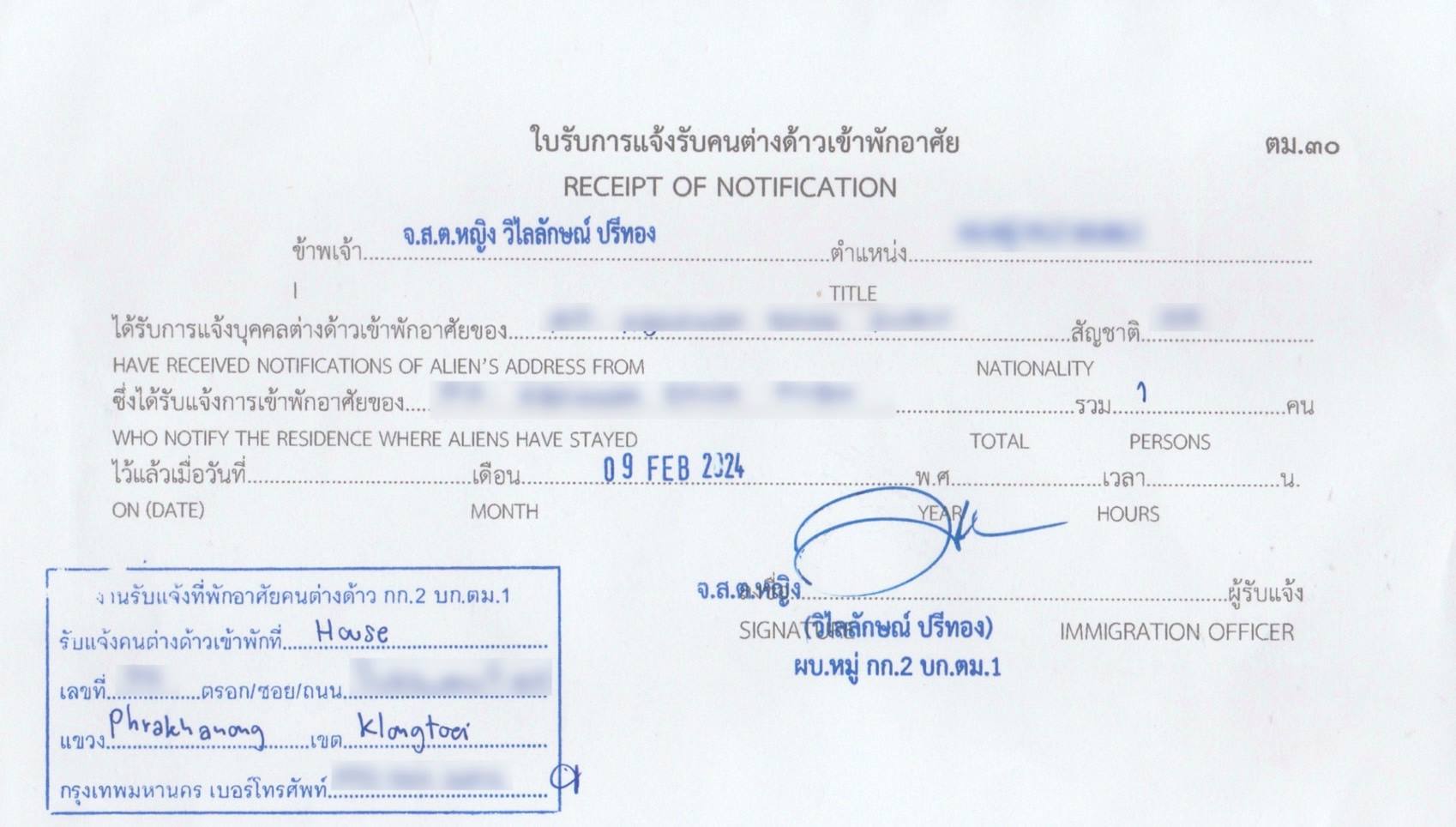What Thai Law Applies to the TM30 Notification of Residence for Foreigners in Thailand?
The Thai law that applies to the TM30 Notification of Residence for Foreigners in Thailand is Section 38 of the 1979 Immigration Act. This law states that foreigners moving into a property, whether temporary or long-term, must be registered via the TM 30 form within 24 hours of their arrival.
Originally, accommodations that were considered “licensed hotels” according to the Hotel Act of 2005 were the main target of this immigration law. However, this was later clarified to apply to any host of foreign nationals in Thailand.
For most of this law’s history the government loosely enforced it, but in recent years they’ve been much stricter. For foreigners living in Thailand, the main problem with not submitting the form is that proof of completing the TM30 is now typically required when extending a 90-day visa.
What Is the Purpose of the TM30 Notification?
The purpose of the TM30 notification is to allow the Thai government to accurately monitor the foreign population in the country for informational purposes. The three main reasons they would want to do this are as follows:
- It gives the government access to more reliable tourism statistics that can inform economic planning and political policy.
- It makes it easier to track someone down who is accused of or is associated with some illegal offense within Thai borders.
- It makes it easier to get ahead of potential terrorism threats within the country and to help with the apprehension of internationally known persons of interest.
Who Is Responsible For TM30 Reporting?
The host, landlord, house owner, or head of a house is responsible for TM30 reporting within 24 hours of the arrival of the guest, regardless of what type of visa they’re in Thailand under. This applies to both Thai and foreign property owners.
If you’re confused about who is in charge of this proceeding, consult the house registration book to see who the registered owner is. Whoever is listed as the head of the household is responsible for submitting the TM30 documentation.
Is There A Penalty For Reporting The TM30 Form Late?
Yes, there is a penalty for reporting the TM30 form late that ranges from 800-1,600 baht.
Why Is the TM30 Registration Important for Expats Living in Thailand?
The TM30 registration is important for expats living in Thailand because it impacts their ability to apply for long-term visas in the Kingdom. This wasn’t always the case, but with the recent strict enforcement of TM30 regulations, Thai immigration now typically asks for it when a foreigner applies for a long-term visa or visa renewal.
How to Register a TM30?
There are several ways to register a TM30, each one with varying degrees of ease, from in-person methods to digital. Your landlord can choose the most convenient option for them, and as long as they submit it, the process is considered complete.
1. Submit the TM30 Form via the Internet
You can submit the TM30 form via the internet, by taking the following 6 steps:
- Prepare the necessary documents. For businesses, this includes a business license or signed copy of business registration confirmation, a letter authorizing the registration, and a copy of the ID of the authorizing person. For private property owners, copies of their Tabien Baan (house registration book) and ID are necessary for TM30 online registration. Foreigners must include a passport copy.
- Visit the Thai Immigration Bureau’s website and register your account by providing your residence and personal information.
- Click, “verify email.” You should receive an email that can be verified within 7 days.
- Wait for approval from the immigration officers and receive a username and password which you’ll use when submitting a TM30 notification.
- Submit a TM30 notification either by using the Immigration Bureau’s online form or by downloading their excel template, filling in the necessary information, and sending it to them. The excel template is useful for larger businesses with many foreigners checking in and out.
- Print confirmation of TM30 submission.
Is There a Faster Way To Submit TM30 Forms as a Business Operator of a Hotel or Apartment?
Yes, businesses operating hotels or apartments can submit TM30 forms faster by using passport readers. The Immigration Bureau’s system is compatible with several types and details them on their website.
2. File TM30 at the Nearest Immigration Checkpoint in Person or by Representative
Filing the TM30 form at the nearest immigration checkpoint in person or by representative is a good option if you’re having problems with the internet registration or simply prefer registering in person. The representative doesn’t need a special form to submit the application on behalf of the landlord as long as all necessary document copies and forms are present. 
3. Mail Your TM30 to the Nearest Immigration Checkpoint
You can mail your TM30 application to the nearest immigration checkpoint as long as the mail is post-dated to within 24 hours of the foreign resident’s check-in. The documents and copies required are all the same as for an in-person application.
To send a TM30 application in the mail, ensure that the documents are in a self-addressed envelope with a 10 baht stamp. If you’re living outside of Bangkok, send it to your nearest immigration office or checkpoint. If you’re in Bangkok, the address you must send the papers to is as follows:
Download TM30 application here
Supervision Division 2, Immigration Division 1, Immigration Office
80th Anniversary Government Complex
120 Moo 3, Chaengwattana Road Soi 7, Thung Song Hong Sub District, Lak Si District, Bangkok 10210
What Documents Do You Need When Registering the TM30 Form at the Immigration Office or by Mail?
Landlords need to prepare the following documents when registering the TM30 form at the immigration office or by mail:
- A completed TM30 application form.
- A copy of the property owner’s ID or passport.
- A copy of the owner’s house registration book or title deed.
- A copy of the rental agreement or the land and sale contract.
The tenant must also provide copies of the following pages of their passport:
- The information page with photo
- The visa page
- The page with the entry stamp.
How To Fill in the TM30 Form?
To fill in the TM30 form, write the details of the property owner on the first page and the foreign tenant’s information on the second page. This will include ID and passport numbers, names, the address of the property in question, and the details of the foreign person’s arrival.
FAQs on TM30 Registration
Does TM30 Registration Have an Expiration Date?
No, the TM30 registration does not have an expiration date as long as you’re staying at one premises. However, if you’ve left the country for even a few days you’ll need to re-register once you’re back at your residence.
If you’re staying in a hotel or guest house within Thailand, this means that your host has likely registered you at that address which means that you’ll then need to register again once you return to your primary location in Thailand.
Should I Complete a TM30 Registration for Everyone Staying at a Property?
Yes, you should complete a TM30 registration for everyone staying at a property who is not a Thai national. You can submit individual forms or you can use the Immigration Bureau’s excel sheet template to register multiple people at once.
Does a Foreigner Need To Do a TM30 Registration at a Property They Own?
Yes, a foreigner needs to do a TM30 registration at a property they own if they are the ones listed as the owner on the title deed and/or in the house registration book. If the foreigner is not the listed owner of the property (E.g. a spouse is listed), they will need to ask the listed landlord to file the TM30 form or request the documents to file the registration on their behalf.
Is the Landlord Allowed To Assign His Property Agent To Submit the TM30?
Yes, the landlord is allowed to assign his property agent to submit the TM30 as long as they supply the proper representative authorization documents. Outsourcing the TM30 application process requires a letter giving authority to the property manager to report on behalf of the landlord with stamps from the tax office on this letter.
After the notification, the landlord will get a stamped return slip (receipt of notification) that the tenant or guest should keep and use when visiting Thai Immigration for a visa extension or reporting.
Have more questions about property ownership obligations when leasing to foreigners in Thailand? Contact the seasoned experts at PropertySights Real Estate for consultation today.

